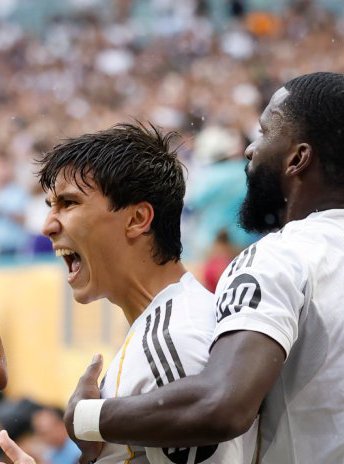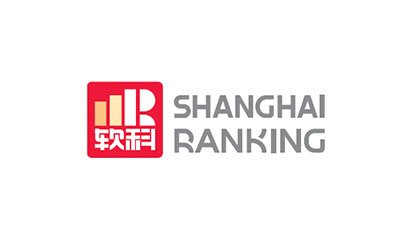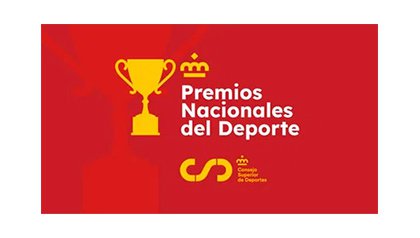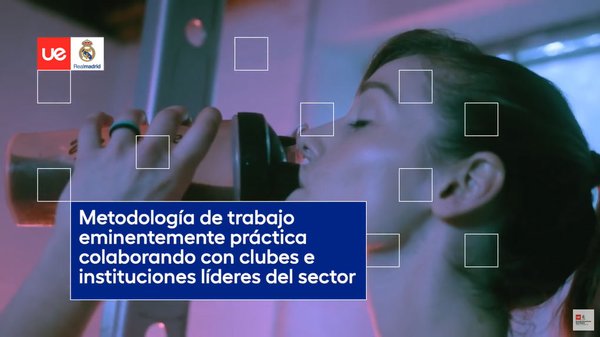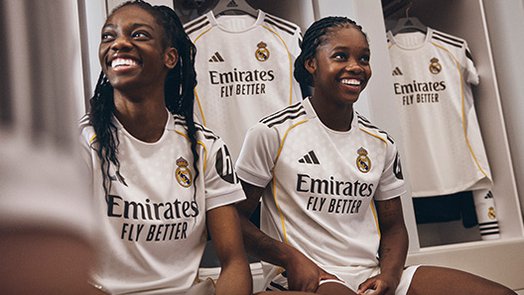Master in Sport Psychology
The Private Master’s Degree in Exercise and Sports Psychology at Escuela Universitaria Real Madrid Universidad Europea is an non-official, intensive 9-month program designed to prepare you to assess, intervene, and optimize the psychological performance of athletes and teams, from grassroots to elite levels.
Through a scientific, practical, and international approach, you will learn to apply innovative strategies to improve athletes’ mental health, well-being, and overall performance both individually and collectively.
What you will learn during the program?
- Implement psychological strategies to support athletes through injuries, rehabilitation processes, and retirement transitions, providing emotional and mental guidance.
- Integrate psychology with other key areas, such as nutrition, communication, and training load management, for a comprehensive, holistic approach to athlete performance.
- Master cutting-edge techniques and tools used in high-performance centers and elite clubs, including applications for eSports and inclusive sports.
- Design intervention programs tailored to different contexts, disciplines, and athlete profiles, addressing the specific needs of diverse sports environments.
Live the Real Madrid experience. During the program, you will have the opportunity to choose an international trip where you will get to know how other countries work.
Private degree issued by Universidad Europea de Madrid
Classes in English | Alcobendas | Start: October 2026 | Faculty of Medicine, Health and Sport | Escuela Universitaria Real Madrid Universidad Europea |
The quality you deserve
Our graduate school
Study plan
Study plan structure
Module 1 - Psychological processes in the sports activity (6 ECTS)
- Learning processes in sports activity.
- Attention and motivation in physical and sports activity.
- Optimum level of activation and emotional management in sports practice.
- Self-confidence and self-concept in the athlete.
- Athlete's locus of control: between optimism and pessimism.
- The dark triad of performance personality: narcissism, Machiavellianism, and psychopathy.
Module 2 - Sports psychology and health (6 ECTS)
- Sport, health, and psychology.
- Sport and physical activity in different contexts.
- Evaluation of the behavioural and psychophysiological indicators involved in physical activity.
- Sport and physical activity with populations with special needs.
- Evaluation of the physical-sports condition of the people.
- Psychophysiology of physical activity and sport.
Module 3 - Intervention in sports psychology (6 ECTS)
- Methodology and planning of the intervention design in sport psychology.
- Quantitative and qualitative instruments of evaluation in psychological intervention in sport.
- Psychological intervention techniques (definition of objectives, management of the optimal level of activation, attention, training in imagination and visualization, management of emotions and self-instructions).
- Multidisciplinary intervention in sport psychology.
- Differences in psychological intervention in individual and collective sports.
- Monitoring and evaluation of the interventions. Study cases.
Module 4 - Psychology in young talent development (6 ECTS)
- Basic psychological processes of base sport.
- Theoretical models of motivation in sports initiation.
- Psychological intervention with young athletes and the transition to professional sport.
- Psychological intervention with coaches and families of young athletes.
- Advice on the relationship between athletes, families, and sports technicians: the importance of education in values in sport.
- Evaluation systems and counselling programs for athletes and grassroots sports coaches
Module 5 - Psychological training for high performance athletes (6 ECTS)
- Psychological variables related to training, performance, and competition.
- Psychological preparation for the competition.
- Specific intervention in the different sports modalities. Emotional processes, anxiety, and coping strategies in high performance athletes.
- Psychology of sports coaches.
- Psychological intervention with referees and sports judges.
Module 6 - Sports psychology in injury recovery and withdraw from sports activity (6 ECTS)
- Psychological effects of overtraining and substance abuse.
- Disabling psychological disorders and conflicts in athletes.
- Psychological implications of the prevention and recovery of sports injuries.
- Withdrawal from sports career.
- Psychological intervention strategies in sports withdrawal.
- Identity and vocational redefinition processes in sports retirement.
Module 7 - Psychology in the management of sports entities (6 ECTS)
- Strategic planning of sports management: an approach from sports psychology.
- Psychological intervention with sports organizations and managers.
- Psychology in the management and direction of sports teams and youth academies.
- Group psychology in the design of sports coaching teams.
- Generalizability in decision-making and sports management.
- Management of leadership and motivation in sports entities.
Module 8 - Psychological intervention in Esports (6 ECTS)
- Introduction to the sector and contextualization of eSports.
- Evaluation and psychological intervention with an eSports team.
- Advice and intervention with eSports coaches.
- Risks and psychopathologies in eSports.
- Future lines of research.
- Application of sports psychology in non-sports areas.
Module 9 - Professional experience and case studies (6 ECTS)
This module allows students to apply and deepen the knowledge and skills acquired during the master’s program through case studies and practical exercises. It focuses on analyzing real-world scenarios, solving industry-related challenges, and simulating professional decision-making processes.
Module 10 - Research methods & final thesis project (6 ECTS)
Design and develop a master’s thesis. Said work can be of two modalities:
- Presentation, intervention, and evaluation of a practical case representative of the field in which the professional practices have been developed or some other field that is relevant to the student.
- Carry out a genuine research project based on specific and relevant objectives and following a design that involves data collection and analysis and evaluation.
- Research methodology in sports and health psychology.
- Quantitative research methods.
- Qualitative research methods.
Competencies developed
- Design an individual or group intervention project in sport psychology.
- Carry out the evaluation of the anamnesis of individual and team sportspersons using quantitative and qualitative tools.
- Analyse and evaluate the socio-occupational situation of the sportsperson by means of quantitative and qualitative techniques, assessing the effect of these factors in the context of sports execution and performance.
- Adapt intervention techniques and programmes, counselling and training in psychological skills, prevention and other psychological tools to the context of physical activity and sport.
- Investigate and evaluate sports organisations and entities, their communication strategies and the structure and management style used.
- Design and execute an evaluation plan of the impact of an intervention in sport psychology in the attention of the needs of sportspersons and their socio-occupational context, using data collection techniques and critical analysis of the information.
- Determine the criteria for the evaluation of behavioural change after psychological intervention in the field of sport.
- Drawing up technical reports with conclusions and recommendations based on the results of the psychological assessment carried out in the context of physical activity and sport.
- Plan and use direct and indirect intervention strategies to enable athletes and teams to make decisions during sport practice.
- Design virtual training and assessment environments through the use of information and communication technologies.
- Design training programmes that improve the training needs of sports coaches and managers in communication skills, motivation and pedagogical and training strategies.
- Design strategies to improve attention and concentration, control of emotions and motivation during physical exercise. Apply in a practical and integrative way the knowledge, skills and competences acquired in real cases related to sport psychology.
What you will learn semester by semester
1
First semester
- Psychological processes in sports: motivation, attention, emotional regulation, self-confidence, and personality factors influencing performance.
- Sports psychology and health: mental health evaluation, psychophysiology of physical activity, and psychology applied to populations with special needs.
- Designing psychological interventions: planning, goal setting, and tools for evaluation and psychological support in individual and team sports.
- Young talent development: psychological strategies for youth athletes, their families, and coaches to support the transition to professional sport and promote education in values.
- High-performance psychology: psychological preparation for competition, coping with stress and anxiety, and working with coaches, referees, and judges.
2
Second semester
- Injury recovery and career transition: psychological support for injury prevention, rehabilitation, and athlete retirement, including identity and vocational redefinition.
- Sports entity management: leadership, motivation, and group psychology in clubs, academies, and sports organizations.
- eSports psychology: psychological evaluation and intervention with eSports players and teams, addressing risks, performance, and mental health.
- Professional experience and case studies: solve real-world challenges through simulations and practical exercises guided by expert mentors.
- Research and Final Thesis Project: design and develop a professional case study or research project, using both qualitative and quantitative research methodologies.
More information
Competencies developed
- Design an individual or group intervention project in sport psychology.
- Carry out the evaluation of the anamnesis of individual and team sportspersons using quantitative and qualitative tools.
- Analyse and evaluate the socio-occupational situation of the sportsperson by means of quantitative and qualitative techniques, assessing the effect of these factors in the context of sports execution and performance.
- Adapt intervention techniques and programmes, counselling and training in psychological skills, prevention and other psychological tools to the context of physical activity and sport.
- Investigate and evaluate sports organisations and entities, their communication strategies and the structure and management style used.
- Design and execute an evaluation plan of the impact of an intervention in sport psychology in the attention of the needs of sportspersons and their socio-occupational context, using data collection techniques and critical analysis of the information.
- Determine the criteria for the evaluation of behavioural change after psychological intervention in the field of sport.
- Drawing up technical reports with conclusions and recommendations based on the results of the psychological assessment carried out in the context of physical activity and sport.
- Plan and use direct and indirect intervention strategies to enable athletes and teams to make decisions during sport practice.
- Design virtual training and assessment environments through the use of information and communication technologies.
- Design training programmes that improve the training needs of sports coaches and managers in communication skills, motivation and pedagogical and training strategies.
- Design strategies to improve attention and concentration, control of emotions and motivation during physical exercise.Apply in a practical and integrative way the knowledge, skills and competences acquired in real cases related to sport psychology.
Admissions
Start your future at Universidad Europea
You can become a student at Universidad Europea in three easy steps.
1
Admission exams
Start your admission process by calling +34 918257527 or request information and our advisors will contact you.
2
Place reservation
Once you have been admitted, secure your place by paying the reservation fee.
3
Enrollment
Submit the required documents to formalise your enrollment.
Requirementes for admissions
For the access to the master's degree/university specialist/university expert it is necessary to meet one of the following requirements:
- To be in possession of a university degree.
- If applicable, accredit professional experience of at least 6 months that is directly related to the field of the degree.
- If applicable, accredit professional internships of CFGS that are directly related to the scope of the degree.
Access profile
This program is specially designed for:
- Degree in psychology and sports science or equivalent.
- Degree in health sciences or education sciences: to be reviewed by the academic and admissions departments.
Faculty
Our teaching staff
Directors
- Susana De Los Reyes
Area director. Sociologist and ICF-certified PCC Coach. Accredited Coach in Relational Methodology by IR. Specialist in verbal and non-verbal communication, as well as systemic and team coaching. Expert in social relations and human resources. Writer and speaker. - Jorge Zambrano
Associate director. Holds a degree in Psychology with specializations in Sports Psychology and Coaching, as well as Human Resources Management and Leadership. Currently works as a Sports Psychologist at an agency representing football players and coaches. - Louise Barraud
Associate director. Holds a degree in Sports Sciences, specializing in Sports Psychology and Coaching, as well as Sports Training. Experienced in the planning, implementation, and monitoring of training programs tailored to the needs of athletes, as well as in coaching strategies and support during the transition out of professional sports. - José María García
Director of the HR Department at Real Madrid CF since 2007. Holds a degree in Psychology and has completed the Senior Business Management Program at IESE. Brings over 40 years of experience in People Management across the Banking, Consulting, and Sports sectors. Has served as a consultant in personnel evaluation and selection for institutions such as the European Parliament, the European Commission, and the Council of Europe. (Pending club approval).
Our Teaching Staff
- Jorge Zambrano Borjabad
Professor of module 1.
Holds a Bachelor's degree in Psychology and specializes in Sports Psychology, Coaching, and HR Management and Leadership. Sports psychologist with experience in agencies representing football players and coaches. Former sailing coach in the United States and rugby player in first and second-division youth teams. - María Salette Marentes
Professor of module 2.
Doctorate in Physical Culture Sciences. Postdoctoral Researcher at the University of Valencia. Holds a degree in Psychology and a Master's in Sports Psychology and Physical Activity. Currently a Postdoctoral Researcher at the University of Barcelona. Specialist in quantitative research. Collaborator of the Advanced Research Group in Physical Activity, Exercise, and Sports Psychology at the University of Valencia. Research focus: social psychology of physical activity, healthy behavior, and psychosocial well-being in high-performance sports. - Pau Mas
Professor of module 3.
Holds a degree in Psychology. MSc in Sports Psychology and Physical Activity. Master’s in Self-Leadership and Group Management. Director of Personal Development at Kaptiva Sports Academy. Head of the Psychology Department at Bàsquet Girona Academy. Member of the international #Psychmapping community. Presenter at the FEPSAC Congress (2022, Padova) and FEPD Congress (2024, Barcelona). Lecturer at the University of Barcelona, Faculty of Psychology (2021–2023). - Joel Guillén
Professor of module 3.
Graduate in Psychology. Master’s in Sport and Physical Activity Psychology. Member of the Sports Research Institute and the Lifestyle, Sport, and Health Research Team at the Autonomous University of Barcelona. Member of the international #Psychmapping community. Psychologist for elite and youth development athletes. Coordinator at Kaptiva Sports Academy. University professor in undergraduate and master's programs, specializing in basic psychological processes and psychological intervention. - Marta Soler González
Professor of module 4.
Psychologist specialized in sports and clinical psychology. Currently Head of the Sports Psychology Department at the Sports Medicine Unit of Clínica CEMTRO. Master's program professor at Alfonso X el Sabio University (UAX), Villanueva University, CES Cardenal Cisneros, and the Madrid Football Federation. - Antoni Tello Portillo
Professor of modules 5 and 8.
Holds a degree in Psychology with a Master's in Sports Psychology and Physical Activity. Sports psychologist focusing on high-performance sports, skill development, and training across individual and team sports in both competitive and non-competitive contexts. Author of the sports psychology chapters in the book "Si nosaltres tenim la pilota, ells no poden marcar" (a soccer-focused book). Collaborates on projects using sports dynamics to enhance workplace culture in companies. - Jana Vancakova
Professor of module 6.
Ph.D. in Health and Sports Psychology at the Autonomous University of Barcelona. Bachelor's and Master's degrees in Psychology from Palacký University Olomouc, Czech Republic, and a degree in Recreology-Leisure Time Pedagogy. Advanced vocational training in Personal and Social Responsibility Implementation at the University of Barcelona. Trained in Gestalt Therapy at the Institut Integratiu in Barcelona. Research focuses on character strengths, resilience, play, leisure time, and imagination. Currently completing postgraduate studies in Integrative Bodywork at the National Institute for Physical Education in Catalonia. Gestalt therapist and sports psychologist. - Joel Puente Fernández
Professor of module 7.
Has extensive experience in health, sports, and education. Currently, a Postgraduate Research Teaching Assistant at the University of Greenwich (London) in the Faculty of Education, Health, and Human Sciences. Personal trainer since 2014, specializing in strength training and working with populations with special needs. Holds a Master's in Sports Science Research, a Bachelor's in Physical Activity and Sports, and a Postgraduate Certificate in Higher Education.
Masterclass
- Juan Miguel Bernat
Sports psychologist and civil engineer specializing in high-performance teams. Currently serves as the psychologist for the men's first team at Levante U.D. and leads the high-performance psychology department. Founder of the company NEW LEVEL, with experience working with coaches and athletes from teams such as Real Madrid, City Football Group, Villarreal, Real Sociedad, and Virtus Bologna.
Frequently asked questions
What is MSc psychology of sport and exercise?
MSc Psychology of Sport and Exercise is a postgraduate programme that focuses on the application of psychological principles and techniques in sports and exercise settings. The programme at Escuela Universitaria Real Madrid takes on an eminently practical approach in which you’ll apply the knowledge acquired in professional settings via internships and work placements.
The programme is designed for individuals who are interested in pursuing careers in sports psychology, coaching, physical therapy, or related fields.
How do I become a sport and exercise psychologist?
There are different routes into a career as a sport and exercise psychologist. If you choose the Master in Sport Psychology at Escuela Universitaria Real Madrid, you will study a programme that follows an experiential learning approach, meaning you will put into practice what you learn as you go along, taking part in internships and work placements at leading sports organisations, including Real Madrid.
Is there a high demand for sports psychologists?
Yes, there is a high demand for sports psychologists, as athletes and sports organisations increasingly recognise the importance of mental skills training and performance enhancement techniques for achieving optimal athletic performance. Sports psychologists work with athletes to help them develop and maintain mental toughness, manage anxiety and stress, set goals, and cope with pressure, among other things.
What does a day as a sports psychologist look like?
The day-to-day of a sports psychologist will vary according to their place of work and the size of the organisation itself. However, in general terms, these are the main tasks of a sports psychologist:
- Meeting with clients or athletes
- Designing and implementing programmes
- Conducting assessments
- Collaborating with coaches and other professionals
- Research and professional development
